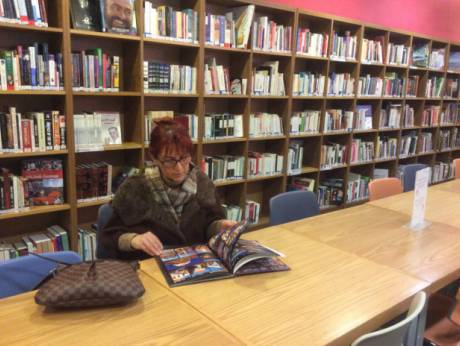
Joseph A. Kechichian, Senior Writer
Beirut: Lebanon boasts the highest rate of reading among Arab states and ranks an impressive 37th globally. But, despite its 95 per cent literacy rate, many believe that the pursuit of knowledge remains an elitist privilege in the country as many Lebanese cannot afford to buy books.
This is why public libraries have always been and continue to be an important resource for Lebanese.
Before the civil war (1975-1990), Lebanon boasted dozens of public libraries even in remote villages, which would each summer draw an influx of residents eager to benefit from such facilities.
During the period of reconstruction that followed the war, the priority was a clean-up campaign given the scale of destruction and the country’s intellectual needs took a backseat.
It wasn’t until the late 1990s, when a non-governmental association, Assabil, came to the forefront to promote sorely needed free public libraries for all that the need for more public libraries was acutely felt yet again.
Assabil builds on a rich legacy and, while Romans are credited for the innovation of public facilities where scrolls were made available in dry rooms to patrons who had just visited baths, Lebanon has boasted an impressive record with schools and libraries for hundreds of years.
The Berytus Nutrix Legum, Beirut’s first law school, flourished under the patronage of Roman emperors as early as 231 AD and survived Justinian I’s order to shut down provincial establishments for political reasons. Its library was unique although only elite students could use it at the time.
Over the years, and especially after independence, the Lebanese placed a strong emphasis on education.
Books, and therefore ideas, shaped the minds of Lebanese. But with the rising prices of books, especially essential foreign language publications, Lebanese find it harder to keep up with their strong literary legacy.
While books written in Arabic sold for about $10 (Dh37), English and French imports sold for an average of $35, as prices are pegged to pounds, dollars or euros.
Even children’s books, probably the most vital of all sectors because youngsters need variety as much as substance, tend to be expensive too, averaging $8 to $12.
Even if the world is very much in the digital age, we still rely on printed material to further our knowledge, an essential ingredient for youngsters who must expand beyond school subjects if they are to reach new heights.
Enter Assabil, which has worked with the ministries of education and culture to revive public libraries and created 12 municipal facilities in Beirut alone.
The first three, at Bachoura, Geitawi and Monot, are now fully operational, with the Tarik Al Jdeideh and Sassine branches scheduled to open next.
There are a total of 80 public libraries throughout Lebanon, which is impressive given that some are in remote locations like Aitit, Srifa, Joun and Jezzine, all in South Lebanon, where access to public facilities are rare.
Two other public libraries operated in Hermel and Zahleh in the Bekaa Valley, while others are scattered from Tripoli in the north to Batroun, and down the coast and Mount Lebanon in such villages as Beit Meri, Hammana, Barouk and Baaqline.
There is even a mobile library, the ‘Kotobus,’ which transports books to Beirut’s northern and southern suburbs where there are currently no libraries.
— This is the second of a three-part article on libraries in Lebanon. The final entry will examine private holdings.



